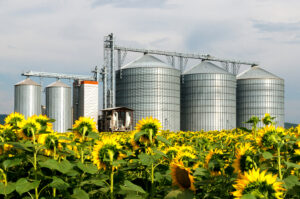
Engineering Biology Metrics and Technical Standards for the Global Bioeconomy
A new report highlights the ten key areas recommended for standards and metrics development to enable the acceleration of the global bioeconomy. The report, entitled ‘Engineering Biology Metrics and Technical Standards for the Global Bioeconomy’ received contributions from AcumenIST Dr Steffi Friedrichs, who was part of a group of experts,

Sampling & Sample-Provision Protocols for AdMas in complex Matrices
The MACRAMÉ Project has published its first set of ‘Sampling & Sample-Provision Protocols for AdMas in complex Matrices’, in order to guide the sample collection that needs to be performed at the MACRAMÉ Use-Case (UCs) sites prior to sending the samples to MACRAMÉ laboratories for testing. Such sample collection is

Good Practice in (Meta)Data Management – a well-written Perspective provides new Impulses far beyond its Community
‘[…] a highly topical issue in the science community: that of research data management and FAIR data.’ [Peer-Reviewer 1] A new paper on data management laments that the processes underlying the best practices of research data management were ‘overly focussed on the needs of specific research projects or aligned to

From Principles to Reality – FAIR Implementation in the Nanosafety Community
Preparing to tackle the challenge of developing safe and sustainable nanomaterials-based solutions to current global challenges including clean energy, sustainable food production and water security requires access to high quality data and appropriate analysis and modelling approaches, a group of leading nanosafety researchers (incl. AcumenIST Dr Steffi Friedrichs for @NanoFabNet1)

MACRAMÉ Data Shepherding – an Approach to the centralised Management of Research Information & Knowledge
The MACRAMÉ Project (Advanced Characterisation Methodologies to assess and predict the Health and Environmental Risks of Advanced Materials) published a detailed report on ‘Information Hub, Data Exchange Format Specifications, and initial Research Output Management Plan (ROMP)’. As a part of its open science philosophy, MACRAMÉ is implementing high quality knowledge

Towards harmonisation of testing of nanomaterials for EU regulatory requirements on chemical safety
A group of experts has identified 11 different needs for action to address 22 information requirement needs across different EU regulatory areas concerning the market access of products containing nanomaterials. In a new publication entitled ‘Towards harmonisation of testing of nanomaterials for EU regulatory requirements on chemical safety – A

EU 2030 Roadmap for sustainable Nanofabrication
The SUSNANOFAB and NanoFabNet Projects have launched a joint White Paper, outlining the recommended ‘EU 2030 Strategic Plan for sustainable Nanofabrication’. The two sister projects, in accordance with the EC requirements, established cross-collaborations and synergies between themselves with the aim of outlining a common and aligned vision for a more

Status, implications and challenges of European safe and sustainable by design paradigms
The implementation of novel safe and sustainable by design (SSbD) practices for the management of chemicals requires a shift from the established risk control paradigms towards prevention-based approaches at the design stage. Such practices, applied at the earliest stages of innovation and throughout the life-cycle of chemicals, materials and products,

Post-pandemic Professional Networks
By way of a crowning conclusion to its 30-months endeavour of establishing the NanoFabNet Hub – an entirely new professional network for collaborations in the field of sustainability and high-tech innovation, the NanoFabNet team published and outlook on ‘Post-pandemic Professional Networks’. Remembering the original planning of the NanoFabNet at the

EU 2030 Strategic Plan for Nanofabrication
The NanoFabNet published its ultimate roadmap to establish and secure the ongoing advancement and innovation in sustainable micro- and nanofabrication; the newly released report ‘EU 2030 Strategic Plan for Nanofabrication – a NanoFabNet Roadmap‘ highlights the findings of 10 detailed analyses and resulting strategies and action plans, conducted and provided

Implementation Roadmap for Infrastructures, Knowledge & Skills Development in Nanofabrication
‘How can the taxonomy for nanofabrication processes be harmonised across the borders of countries and disciplines, as well as language- and education-barriers?’ … this is the question tackled by the NanoFabNet team in its newly published ‘NanoFabNet Strategy & Implementation Roadmap on Infrastructures, Knowledge & Skills Development‘. Building on the

Regulatory and policy considerations around genome editing in agriculture
In a newly published book on ‘Applications of Genome Modulation and Editing‘ (book series: Methods in Molecular Biology (MIMB, volume 2495), Drs Steffi Friedrichs (AcumenIST SRL), Karinne Ludlow (Monash University) and Peter Kearns (SwiftEST SARL) analyse and discuss 25 countries and regions that have published results or ongoing investigations and

Mapping the scientific Landscapes of Nanofabrication & Sustainability
A new NanoFabNet report delineates the boundaries of the scientific fields of ‘nanofabrication’ and ‘sustainability’ in search of overlaps in both research and innovation (R&I) topics and individual experts that specialise in their pursuit. The NanoFabNet aims to establish an international hub for sustainable nanofabrication, whose structure, business model, detailed

International Cooperation on sustainable Nanofabrication
The newly published NanoFabNet Implementation Roadmap for International Cooperation emphasises the NanoFabNet’s efforts to strengthen the existing linkages between stakeholders in sustainable nanofabrication for the sake of enhancing international cooperation. The Roadmap identifies the dimensions concerning sustainability in nanofabrication (“raising awareness of sustainability”, “compliance with regulation and legislation”, “implementation of

How to reach Sustainability in Nanofabrication
The NanoFabNet, and international hub for sustainable nanofabrication, has published its ‘NanoFabNet Strategy & Implementation Roadmap for Sustainability in Nanofabrication’. Building on the NanoFabNet ‘Report on the Concepts & Disciplines of Sustainability in Nanotechnology & Nanofabrication’ (published in October 2020), in which the NanoFabNet Concept of Sustainable Nanofabrication was introduced,
News Tags
News Categories
- Digitalisation (6)
- Entrepreneurship (1)
- Patent Analysis (2)
- Press (68)
- Panel Discussions (12)
- Presentations (18)
- Publications (38)
- Regulatory Affairs (3)
- Standards (18)
- STI Policy (31)
- Policy Assessment (10)
- Statistics & Indicators (9)
- Sustainability (16)
- Technology Assessment (20)
- Technology Foresight (4)
- Technology Governance (22)
- Technology Validation (6)
- Trust in Science (1)
- Women in Business (1)

